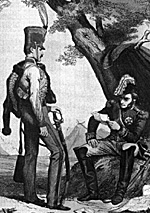However, deserved or otherwise, I do
feel bound to point out in defence of the Germans that Peter Hofschröer
is actually a "little Islander", so one shouldn't hold
them entirely responsible for his letter in FE32. Still, the Germans
should really be more careful about who they give passports to.
Of course, every cloud does have a silver lining and here in this
little island schweifen ist golden, perhaps.
Peter, the remark in the last sentence
of your final paragraph was just plain silly. You can add talking
b****cks to your other linguistic skills.
(Editor: John took the trouble to include
tabular data of all the "results of the major league games"
- which I have checked. I am not printing it as it would take
up three pages of the magazine, and can be easily checked by those
so inclined. It will appear on the web site at www. firstempire.ltd.uk)
It would seem that during the period
1795 to 1812, when the Prussians were either sitting on their
arses or having them kicked, the British army played a "significant
role in winning" at least 31 battles, which, as it happens,
is rather more than the Prussians managed during the entire Revolutionary
and Napoleonic period. Indeed, the ungenerous would be justified
in pointing out that apart from a couple of encounters during
the Revolutionary wars, the Prussians did not win a single battle
without considerable help from their friends. Naturally, I would
not be so uncharitable and, to be fair, the British army does
owe a considerable debt to the Prussians.
It is not generally realized that it
was the Prussians who pioneered the use of reverse slope tactics,
in front of Vierzehnheiligen at Jena, in 1806. There was, however,
a fundamental flaw in the Prussian's application, which was this.
It is not a good idea to allow the enemy to occupy the higher
ground to one's front, particularly if it includes a village.
This, of course, was quickly recognized by Wellington who refined
the concept into the battle winning tactic used so successfully
in the Peninsula.
One has to concede, grudgingly of course,
that the Prussians did make it to the final, but the provisional
scores at full time in Group 1 seems to be something like Russia
29, Austria 48, Britain 56 and France 144. Group 2 was won by
the Prussians with 17. Appeals for foul play to the editor please,
clearly marked as such on the outer envelope to save him the bother
of having to open them. The Austrians come out of it rather well,
they even had an away win against the Russians in 1812.
Just a moment, there is a late objection
from the Portuguese. Apparently the Portuguese Army played a "significant
role in winning" at least 23 battles. Oh dear, I'm afraid
it's relegation to runner up in Group Two for Prussia. I don't
know what you have in that snuff box of yours, Peter, but it must
be good stuff.
On to more constructive matters. Other Aide de Camp sections: This article appears in MagWeb (Magazine Web) on the Internet World Wide Web. I was sitting in my car the other Sunday,
watching my son play rugby and listening to a programme on BBC
Radio 4 hosted by Michael Parkinson. It was one of those chat
shows where a number of different topics are discussed and in
the course of the conversation, I can't remember exactly what
prompted it, it was mentioned that some recent research had been
undertaken by the EU which showed, amongst other things, that
the Germans had the reputation of being the rudest people in Europe.
I was sitting in my car the other Sunday,
watching my son play rugby and listening to a programme on BBC
Radio 4 hosted by Michael Parkinson. It was one of those chat
shows where a number of different topics are discussed and in
the course of the conversation, I can't remember exactly what
prompted it, it was mentioned that some recent research had been
undertaken by the EU which showed, amongst other things, that
the Germans had the reputation of being the rudest people in Europe.
French Combined Grenadier Battalions
Grenadiers de la Reserve
Uniforms and flags
Back to Table of Contents -- First Empire #33
© Copyright 1997 by First Empire.
Other military history articles and gaming articles are available at http://www.magweb.com